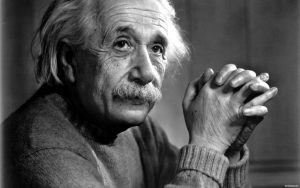Albert Einstein, a German-born theoretical physicist, recognized as one of the greatest and most influential physicists of all time.
Biographical Overview
Born in Germany, 1879-1955 Physicist Developed the general theory of relativity, one of the two pillars of modern physics, and best known in popular culture for his mass–energy equivalence formula E = mc2 – dubbed “the world’s most famous equation.”
Awards
Barnard Medal, 1920
Nobel Prize in Physics, 1921
Matteucci Medal, 1921
ForMemRS, 1921
Copley Medal, 1925
Max Planck Medal, 1929
Time Person of the Century, 1999
Worldview
Using a biblical worldview perspective, Einstein successfully applied the scientific method to investigate the laws of nature, His worldview is notable from what he said –
“God does not play dice with the universe.”
“No amount of experimentation can ever prove me right; a single experiment can prove me wrong”
“Knowledge is limited. Imagination encircles the world.”
“I’m not an atheist, and I don’t think I can call myself a pantheist. We are in the position of a little child entering a huge library filled with books in many languages. The child knows someone must have written those books. It does not know how. It does not understand the languages in which they are written. The child dimly suspects a mysterious order in the arrangement of the books but doesn’t know what it is. That, it seems to me, is the attitude of even the most intelligent human being toward God. We see the universe marvelously arranged and obeying certain laws but only dimly understand these laws. Our limited minds grasp the mysterious force that moves the constellations.”
“Subtle is the Lord, but malicious he is not.”
“I want to know how God created this world… I want to know his thoughts, the rest are details.”
“”The man who regards his own life and that of his fellow creatures as meaningless is not merely unfortunate but almost disqualified from life.”
“Science without religion is lame, religion without science is blind.”
“As a child I received instruction both in the Bible and in the Talmud, I am a Jew, but I am enthralled by the luminous figure of the Nazarene. No one can read the Gospels without feeling the actual presence of Jesus. His personality pulsates in every word. No myth is filled with such life.” Saturday Evening Post, October 26, 1929
“Whoever has undergone the intense experience of the successful advances in this domain [science] is moved by profound reverence for the rationality made manifest in existence… the grandeur of reason incarnate in existence.”
“Certain it is that a conviction, akin to religious feeling, of rationality or intelligibility of the world lies behind all scientific work of a higher order… This firm belief, a belief bound up with deep feeling, in a superior mind that reveals itself in the world of experience, represents my conception of God.”
“Everyone who is seriously engaged in the pursuit of science becomes convinced that the laws of nature manifest the existence of a spirit vastly superior to that of man, and one in the face of which we with our modest powers must feel humble.”
“My religiosity consists of a humble admiration of the infinitely superior spirit who reveals himself in the slight details we are able to perceive with our frail and feeble minds. That deeply emotional conviction of the presence of a superior reasoning power, which is revealed in the incomprehensible universe, forms my idea of God.”
Albert Einstein


